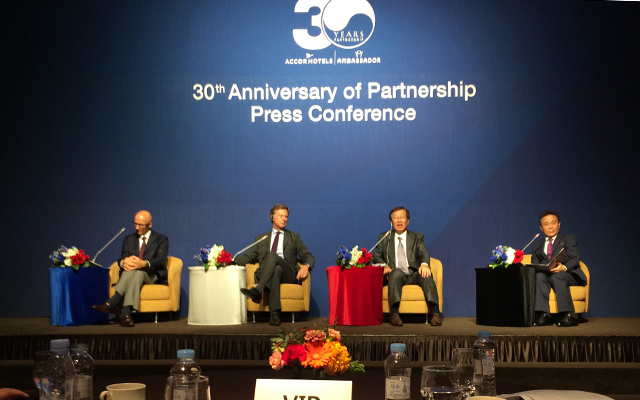
AccorHotels chairman and CEO Sebastien Bazin is thinking big on South Korea even as the media badgered him about the current oversupply and discounting at an event yesterday in Seoul marking 30 years of Accor’s partnership with Ambassador Hotel Group of Korea.
Although the Accor Ambassador Korea (AAK) joint venture is set to manage 32 hotels in the country by 2021, from 23 properties now, Bazin, responding to a question from TTG Asia, said: “As good as 32 is, this is not big enough for me. We could afford to have 100 hotels here in the foreseeable future and this is what I aim to build with my friend and partner (referring to chairman of Ambassador Hotel Group, Jungho Suh).”
To questions from the local media on the current slowdown, brought about both by new supply and frosty China-South Korea relations, Bazin urged South Korea not to underestimate its ability to attract “many, many more” visitors, including Chinese, in the future, because it has a strong economy, base of multinationals, culture and attractions.

AAK’s latest management contract, a new-build ‘hotelplex’ in Seoul dubbed ‘Seoul Dragon City’, alone adds 1,700 rooms in four Accor-branded hotels, Grand Mercure, Novotel, Novotel Suites and Ibis Styles under one roof. TTG Asia understands it is doing occupancies of 25 to 30 per cent with half the inventory opened since last month. The other half will come on stream in the next few months.
But Bazin is unfazed. Said Bazin: “I sensed in the last couple of months some sense of panic and people questioning the quality of hotels, number of hotels, competency of the operators. Seoul is the seventh destination (city) in the world. It is not here by accident. You have very strong economy, very strong culture, very strong education, very strong multinationals…The only way they will come to Seoul is whether hotels exist or whether sharing economy exists. Accor will do both.
“So, as much as people are suffering from China tourism ban, please accept that in any sector, you could suffer two or three years. But the future is bright, including in hospitality. And anybody who is frustrated or afraid, is making the wrong decision. My job is to build for the next 10-20 years ahead, not the next two or three years ahead.”
Bazin pointed out that Accor alone operates more than 300 hotels in Australia (including its recent Mantra Group acquisition, subject to regulatory approval) – and Australia’s population is half that of South Korea’s (over 50 million). France has 18,000 hotels; Accor has 1,600 hotels there, he said.
“Yes, in our industry, you could have in some years supply outpacing demand and you could suffer for 24-36 months. But a hotel investment lasts 40 years. Don’t ever lose faith in your 40-year investment. China will come back. China travellers will be bigger than ever before for (South) Korea. I said before, from 120 million now, it could be 200 million Chinese visitors in 20 years. The bigger decision you have to make is how to ‘mix’ Chinese guests efficiently with non-Chinese or domestic guests (due to cultural differences that may require this).”
He added: “I’ve been told about oversupply in Seoul, New York, Amsterdam, and they are all wrong. It takes time to catch up, but there’s always greater demand than supply. People forget there’s a new emerging class in every country in the world who can afford to travel. Why they can afford it? It’s the enormous increase in LCCs in Asia, Europe, the US – the price of the same travel is 30 per cent cheaper than seven years ago.”
Ambassador Hotel Group’s Suh likewise is upbeat, saying South Korea and China relations will improve. Moreover, Suh pointed out that with increased quality of life, domestic tourism will increase. As well, with Accor’s acquisition of FRHI, AAK, which has been focusing largely on midscale, will be able to expand its portfolio of luxury brands. A Fairmont Ambassador Seoul, Accor’s first luxury hotel in South Korea, will open in 2020.
“So while times may be challenging now, longhaul there is a bright future,” he said.
“Having hotels is not a problem, it’s what kind of hotels. Those without competitiveness will not survive. We, with a global hotel group, will.”
Bazin said the one lesson from the ban was the importance of not relying too heavily on any market, as South Korea has done with China. “We (AAK) realised in the last 10 months that we probably missed spending time investigating the domestic market, and we have (subsequently) been able to attract domestic Korean travellers to our hotels, which we did not pay attention to before. The lesson is don’t ever depend on one source.”
- New ‘hotelplex’ in Seoul a test for Accor – read all about it in tomorrow’s daily



















